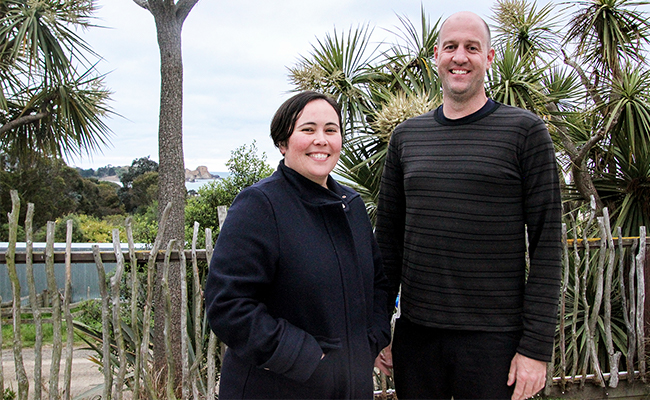
Co-Directors of the new CoRE Coastal People : Southern Skies, Marine Science Associate Professor Chris Hepburn and Māori Physical Education and Health kairangahau (researcher) Associate Professor Anne-Marie Jackson.
A voyaging waka and Te Pae Māhutonga (the Southern Cross) are the symbols of the adventurous spirit of the new Otago-led Centre of Research Excellence (CoRE) Coastal People: Southern Skies (CPSS).
CPSS was recently awarded just over $32 million by the Tertiary Education Commission (TEC) in the latest CoRE funding round and is led by co-Directors Associate Professors Chris Hepburn and Anne-Marie Jackson.
The use of Te Pae Māhutonga as one of the key markers for the CoRE reflects its role in connecting the coastal people of the South Pacific who together are facing a shared, yet uncertain, future in the face of environmental change.
“The moana (ocean) is the thread that binds and connects the Pacific,” Associate Professor Jackson says. “But that ocean is changing as a result of ocean warming and acidification, climate and sea-level rise, and these issues affect our identities, histories and well-being as coastal people.”
In this context of a changing environment, CPSS's mission is to connect, understand and restore coastal ecosystems through transformative research and local action, with mauri ora (flourishing wellness) of coastal communities guiding its overall vision.
The story of CPSS began 13 years ago, when Associate Professor Hepburn was a postdoc and Associate Professor Jackson a PhD student, during shared weekly car journeys along a stretch of coast steeped in history to the small coastal settlement of Karitāne.
Since then, together with their colleagues, they have taught and supervised thousands of students who learn how to work in partnership with local communities on issues of importance.
One such initiative has been the creation of an annual East Otago Taiāpure Research evening that allows tauira who have conducted research in the Karitāne area to present their mahi to the local community under the mana of Kāti Huirapa ki Puketeraki.
“At the heart of CPSS is diversity in our team through which we will build a research community that is more reflective of our community in Aotearoa and the Pacific.”
Tangata Tiaki Brendan Flack, of Kāti Huirapa, reflects that Puketeraki is a kōhanga, a nursery, where students and researchers learn their craft, adding “they leave a piece of themselves here, and they take a piece of our place with them wherever they go."
This successful community partnership approach will be the CoRE's platform that brings together world-leading multi-disciplinary research programmes involving more than 80 researchers across Aotearoa's universities, alongside other partners including iwi organisations, wānanga, NIWA, Te Toki Voyaging Trust and Coastguard Boating Education.
“CPSS will support the voice and capability of coastal communities,” Marine Science Associate Professor Hepburn says.
“They are at the front-line and will provide the leadership we need as our oceans continue to change.”
Led by a team of early career researchers, CPSS will use a tuakana/teina (senior/junior) mentoring model, drawing on strong mentorship from senior colleagues and community leaders and elders.
“Our leadership structure will allow for the growth of emerging researchers into new roles throughout the funding period, and training opportunities will be tailored toward Māori and Pasifika to encourage strong community engagement and future careers in marine science, climate change and community well-being.”
“At the heart of CPSS is diversity in our team through which we will build a research community that is more reflective of our community in Aotearoa and the Pacific.”
The CoRE's research programme also extends to Pacific-based communities who share connections of whakapapa, a shared ocean and are facing similar climate change challenges.
The design of the CoRE's research is visualised as a voyaging waka with two core foundations – a marine hull and a well-being hull – with Te Pae Māhutonga visible above as the overarching model of well-being, incorporating the guiding values based on kaitiakitanga and mana, and the governance and management structure.
Two tumu (moorings) represent the monitoring and training ambitions of CPSS, and the research platform that connects the two hulls is woven together by themes of connecting, understanding and restoring. The two sails represent voyages and innovations that lead to new journeys and destinations.
“Innovations will capture the spirit of collaborating in new ways by funding pilot studies that focus on technological advances, blue-sky ideas and novel combinations of research teams alongside local communities,” Associate Professor Hepburn says.
He adds that CPSS will be transformative in approaching the problem of a changing marine environment and will seek to connect what appear to be disparate ways of thinking.
“Our exciting research and teaching programme will inspire different types of people to meet the challenge we all face.”
Kōrero by Guy Frederick, Sciences Communications Adviser